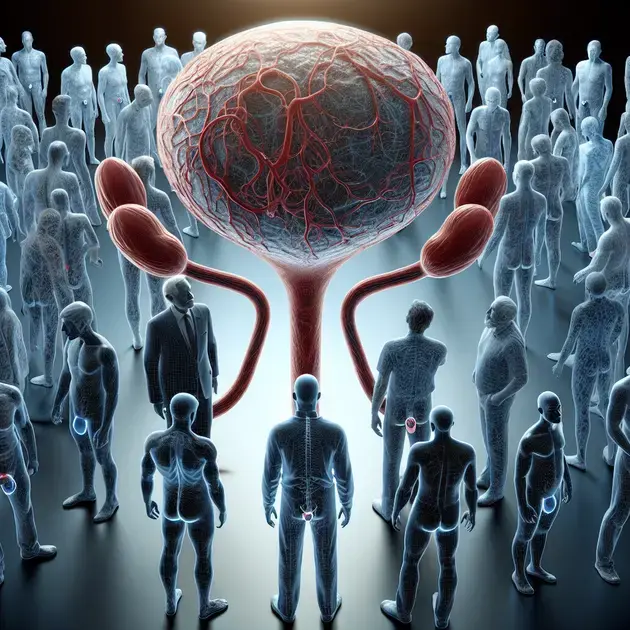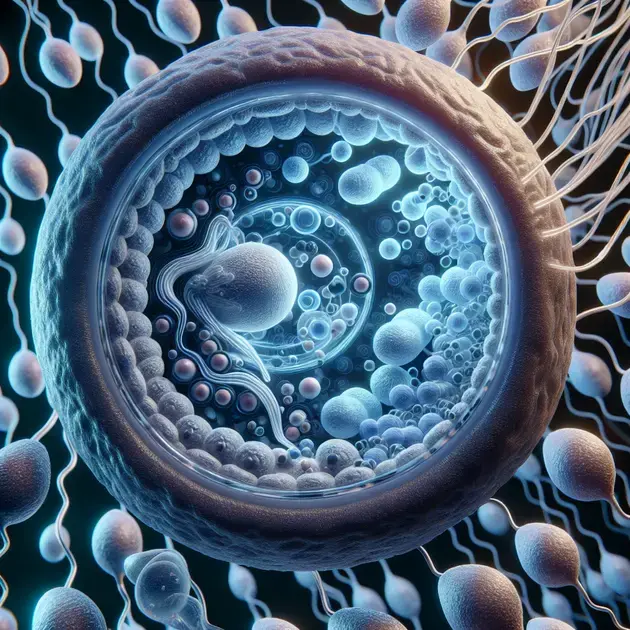The prostate is a small, walnut-shaped gland found in men that plays a crucial role in the reproductive system. Understanding the prostate and what it does is essential for men’s health and overall well-being.
One important function of the prostate is to produce fluid that mixes with sperm and other fluids during ejaculation. This fluid helps to nourish and protect the sperm, increasing the chances of successful fertilization. It’s important to be aware of the prostate’s functions to detect any issues early on and maintain good prostate health.

**
Understanding the Prostate Functionality
**
The prostate is a small gland located below the bladder and in front of the rectum in male reproductive systems. Its primary function is to produce fluid that nourishes and protects sperm. Understanding the prostate functionality is crucial for overall male health and well-being.
Step-by-Step Guide to Understanding the Prostate Functionality:
1. Research reputable medical websites such as WebMD or Mayo Clinic to learn more about the anatomy and purpose of the prostate gland. These websites provide detailed information written and reviewed by medical professionals.
2. Consult with a healthcare provider or urologist to discuss any specific concerns or questions about prostate functionality. They can provide personalized information based on your individual health status.
3. Use educational resources such as health magazines or online forums dedicated to men’s health to gather insights and tips on maintaining a healthy prostate.
4. Stay informed about the latest research and developments in prostate health by subscribing to newsletters from reliable health organizations like the American Urological Association.
5. Incorporate prostate-friendly foods such as tomatoes, green tea, and nuts into your diet to support prostate functionality and overall wellness.
**
The Prostate’s Role in Reproduction
**
The prostate plays a crucial role in the reproductive system by producing seminal fluid, which mixes with sperm from the testicles to form semen. This fluid provides nutrients and protection to sperm, increasing their chances of successfully fertilizing an egg.
Step-by-Step Guide to Understanding the Prostate’s Role in Reproduction:
1. Explore anatomy textbooks or online resources like PubMed to delve deeper into how the prostate interacts with other reproductive organs such as the testes and seminal vesicles during the process of ejaculation.
2. Watch educational videos on platforms like YouTube or Khan Academy that explain the journey of sperm from production in the testes to ejaculation through the urethra, highlighting the role of the prostate along the way.
3. Attend workshops or seminars on male reproductive health offered by universities or healthcare institutions to gain firsthand knowledge from experts in the field.
4. Join online forums or support groups for individuals interested in reproductive biology to engage in discussions and share insights about the prostate’s role in reproduction.
5. Participate in community health events that focus on men’s reproductive health to receive free screenings and information about maintaining a healthy prostate for optimal reproductive function.
**
Importance of Prostate Health
**
Maintaining prostate health is essential for preventing conditions such as prostatitis, benign prostatic hyperplasia (BPH), and prostate cancer. Regular check-ups and lifestyle choices play a significant role in promoting prostate health and overall well-being.
Step-by-Step Guide to Understanding the Importance of Prostate Health:
1. Schedule annual prostate exams with a healthcare provider to monitor any changes in size, shape, or function of the prostate gland. Early detection of potential issues can lead to better treatment outcomes.
2. Explore health apps like Ada or Your.MD that offer personalized assessments and recommendations for maintaining prostate health based on individual risk factors and symptoms.
3. Engage in regular physical activity such as aerobic exercises, yoga, or weight training to improve blood flow and reduce inflammation in the prostate gland.
4. Adopt a balanced diet rich in fruits, vegetables, whole grains, and lean proteins to support overall prostate health and reduce the risk of developing prostate-related conditions.
5. Join support groups or online communities focused on prostate health to share experiences, gain insights from others, and stay motivated in prioritizing proactive measures for a healthy prostate.

**The Impact of Prostate Health on Urinary Function**
The Importance of Prostate Health
Prostate health plays a crucial role in urinary function and overall well-being. The prostate gland is responsible for producing a fluid that combines with sperm to create semen. When the prostate is inflamed or enlarged, it can lead to various urinary problems such as frequent urination, urinary urgency, and difficulty in starting or maintaining a urine stream.
Impact of Poor Prostate Health on Urinary Function
Poor prostate health can significantly impact urinary function. Conditions like prostatitis, benign prostatic hyperplasia (BPH), and prostate cancer can all cause urinary symptoms that affect quality of life. For example, BPH can lead to bladder obstruction and incomplete emptying of the bladder, resulting in increased risk of urinary tract infections and other complications.
Preventive Measures for Prostate Health
There are several ways to promote and maintain good prostate health to support optimal urinary function. A balanced diet rich in fruits, vegetables, and whole grains, along with regular exercise, can help reduce the risk of prostate problems. Additionally, staying hydrated and avoiding excessive alcohol and caffeine consumption can also benefit prostate health.
Consultation with Healthcare Professionals
Regular check-ups with a healthcare provider are essential for monitoring prostate health and catching any potential issues early. If experiencing urinary symptoms or have concerns about prostate health, it’s important to seek medical advice promptly for proper diagnosis and treatment. Ignoring symptoms can lead to complications and worsen the overall condition.
Conclusion
In conclusion, maintaining good prostate health is vital for supporting proper urinary function and overall well-being. By being proactive about prostate health through healthy lifestyle choices and regular medical check-ups, individuals can reduce the risk of developing urinary problems associated with poor prostate health. Taking care of the prostate now can help prevent more serious issues in the future.
**Navigating Prostate Cancer Diagnosis and Treatment**
Understanding Prostate Cancer
Prostate cancer is a common type of cancer that affects the prostate gland in men. It develops when cells in the prostate mutate and multiply uncontrollably, forming a tumor. Prostate cancer can have varying degrees of aggressiveness, with some tumors growing slowly and others spreading quickly to other parts of the body.
Diagnosis of Prostate Cancer
Diagnosing prostate cancer typically involves a combination of screening tests, such as a digital rectal exam and a prostate-specific antigen (PSA) test, followed by a prostate biopsy for confirmation. Once a diagnosis is made, further tests may be needed to determine the stage and extent of the cancer, which is crucial for developing an appropriate treatment plan.
Treatment Options for Prostate Cancer
There are several treatment options available for prostate cancer, depending on the stage of the cancer and the individual’s overall health. These options may include active surveillance (closely monitoring the cancer without immediate treatment), surgery, radiation therapy, hormone therapy, chemotherapy, or a combination of these approaches.
Importance of Multidisciplinary Care
Prostate cancer treatment often involves a multidisciplinary team of healthcare professionals, including urologists, oncologists, radiation oncologists, and other specialists. This team-based approach ensures that the patient receives comprehensive care that addresses all aspects of their treatment, from medical interventions to emotional support.
Lifestyle Changes and Supportive Care
In addition to medical treatments, making lifestyle changes such as maintaining a healthy diet, exercising regularly, and managing stress can help support overall health and well-being during prostate cancer treatment. Supportive care services, such as counseling, support groups, and palliative care, can also provide comfort and guidance throughout the treatment process.
Conclusion
In conclusion, navigating a prostate cancer diagnosis and treatment journey can be complex, but with comprehensive medical care, support, and proactive lifestyle choices, individuals can effectively manage the condition and enhance their quality of life. By working closely with healthcare providers and adopting a holistic approach to treatment, patients can face prostate cancer with resilience and optimism.
**
Conclusion
**
Prostate Health and Urinary Function:
Understanding the critical connection between prostate health and urinary function is paramount for overall well-being. The prostate gland’s role in producing fluid essential for semen is integral, but issues like inflammation or enlargement can lead to troublesome urinary symptoms. Proper maintenance of prostate health through healthy lifestyle choices and regular medical check-ups can significantly reduce the risk of developing urinary problems.
Prostate Cancer Diagnosis and Treatment:
Prostate cancer is a prevalent condition that requires careful navigation from diagnosis to treatment. Screening tests such as digital rectal exams and PSA tests, followed by biopsies, play a crucial role in diagnosing the disease accurately. Treatment options vary depending on the cancer’s stage and aggressiveness, including surgery, radiation therapy, and hormone therapy, among others.
Comprehensive Care and Lifestyle Changes:
It’s essential for prostate cancer patients to have access to multidisciplinary healthcare teams for comprehensive treatment. This team-based approach ensures holistic care, from medical interventions to emotional support. Lifestyle changes like maintaining a healthy diet, exercising regularly, and managing stress can not only support overall well-being but also complement medical treatments effectively.